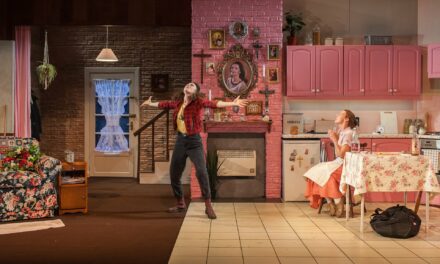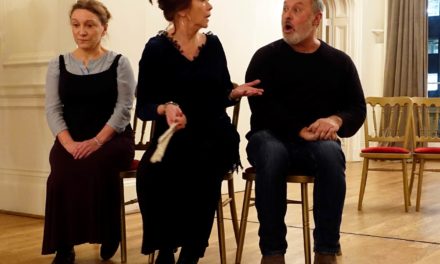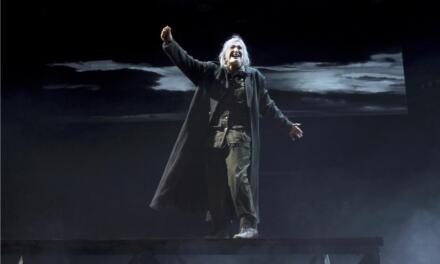Romina Paula is perhaps best known outside Argentina for her work as an actress in seminal films such as Santiago Mitre’s El Estudiante (English title: The Student, 2011), Mariano Llinás’s La flor (The Flower, 2016-18) and Matías Piñeyro’s Viola (2012). She made her directorial debut as a film director this year with De Nuevo Otra Vez (Again, Once Again, 2019) but has been working as a writer-director in theatre for some years now. El Tiempo Todo Entero (Time Entirely Whole, 2010), inspired by Tennessee Williams’ The Glass Menagerie, was a bold and imaginative reflection on the outsider while Fauna (2013) looked at what it means to try and create lives that have been rendered invisible. Reinos (Kingdoms, 2019), a new collaboration with Agustina Muñoz and Margarita Molfino, gravitates around the latter’s grandmother, Leonor, who wrote an intimate diary as a young woman in rural Córdoba between 1934 and 1942. Molfino’s mother found the diary after her grandmother’s death in 2011 and the diary serves as a starting point for the piece: a way of reflecting on a rural experience where the female (rather than the male voice of gaucho literature) predominates, a way of thinking through landscape and sound—from the animals and birds that populate the area to the wider sounds of chopping wood and working the land. It is also a way of reflecting on the role of women in a world where Leonor’s brother is permitted to go to university but she has to stay home. Writing becomes a way of making sense of her world.
The piece, co-written and co-directed by Paula, Muñoz, and Molfino, has a dream-like rhythm. It begins with the family gathered at the back of the stage, hand-held candles illuminating their faces as a woman reads from a diary. It captures the intimacy of what is being shared with the audience and works towards forging the idea of the family that will come to inhabit the stage. Labour is evidenced in the hauling of logs, the chopping of wood, the sense of movement as characters move in and out of the stage discussing a sensation, a sound, a person, a task. A bench, stage left, has clothes scattered across it that the actors use to craft the different figures within the family. Matías Sendón’s inclining set gives the impression of a hillside. Sendón’s lighting mutates through the different moods of the play from crepuscular blue of the close of day to the glorious yellow of a golden morning. Character here is a loose construct—the family is a fluid entity with characters stepping in and out of the role. Susana Pampín is memorable as the mother-figure, a voice of reason but also conservatism. This is, however, a choral piece—words overlapping with Liza Casullo’s sonic landscape where birdsong and grass brushing against the wind fold into live recorded music. Rosario Bléfari gives voice to the sounds of the rural world in a role that merges the human and the environmental.
Watching the piece, I had the sense of engaging with an animated impressionist painting. Whether the piece sustains its 75-minute running time is perhaps subject to debate; Kingdoms presents an insular world that as audience members we are permitted to peer into from a distance. I never felt part of the world on stage but admired the picturesque qualities of the stage pictures, the engagement with feminist ideals, the literary qualities of the writing. Molfino, Munóz and Paula’s production offers an opportunity to sit back and experience a rural landscape from the perspectives of the three generations on stage in an unhurried manner. This is slow theatre where mood firmly trumps action. There is much to admire here, even if the lack of dramatic action means that it never quite gels as a coherent whole. That said, the performances have a commitment and focus—from Mariano Saborido’s outsider who comes to take his place within the community, embodying pregnancy in the sporting of a cushion to the belly, to Margarita Molfino’s restless teenager. And at the end of the piece, as three actors sport an outfit made of rushes that converts them into birds, there is the sense of the human and the natural world becoming one. In an era where the ravaging of the environment has become the key issue of the day, Kingdoms’ embodiment of a world where humans are encouraged to listen to nature and find a way of coexisting in harmony, feels pretty resonant.
Reinos (Kingdoms) plays at the Sarmiento theatre, Complejo Teatral de Buenos Aires until 7 December
This post was written by the author in their personal capacity.The opinions expressed in this article are the author’s own and do not reflect the view of The Theatre Times, their staff or collaborators.
This post was written by Maria Delgado.
The views expressed here belong to the author and do not necessarily reflect our views and opinions.


















